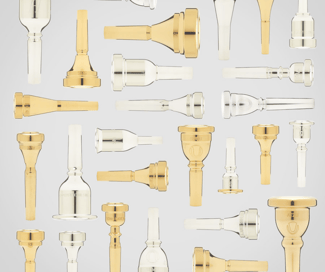3 Facts Mouthpiece Manufacturers Will Never Publicize


A manufacturer's website is probably one of your first visits when you search for a new mouthpiece. You want to know how they are made, the mouthpiece specifications, and what those specifications will do for you. Though it is not with the intent to mislead or harm you, most manufacturers will not include these 3 facts about their provided information that can impact your choice.
1. Diameter, depth, throat, and rim width measurements are not universal between brands
Think of your brass instrument mouthpiece rim. Is it totally flat? No! There is some curve to it, some contour. The measurement you are seeing is gained from specific curve points on the mouthpiece. No two manufactures are measuring from the same points on the curve so comparing these data points between brands is not a science. rather it is a place to start. Solution? When you research your next mouthpiece, start with the measurement you are looking for and try a range of 2-3 mouthpieces. You will have a greater chance of success in finding the diameter you are looking for.
2. CNC Machining does not equate to consistent manufacturing.
CNC manufacturing offers exact replicas of the design that is entered into the computer. The mouthpiece is created by a large quantity of cuts into the metal to produce the final product. To reduce manufacturing time, some companies reduce the cutting time which then requires excessive polishing. Polishing removes metal from the mouthpiece which affects the original design of the mouthpiece. Little polishing removes minimal amounts of metal and protects a manufacturers consistency. Learn about Denis Wick Products mouthpiece manufacturing here.
Like what you're reading? Sign up to Denis Wick Tips for our newest blog post! 
3. What does the mouthpiece description actually tell you?
Have you ever bought the mouthpiece that said "great for high range and projection" but it does the exact opposite? It is not because the manufacturer purposely misled you. It is a rule of thumb that a shallower mouthpiece will aid in higher range, but there our outliers to these rules of thumb. Your personal anatomy, the instrument you are playing, your ability to play on a really shallow or really deep mouthpiece, etc. Your primary goal when looking for a mouthpiece should be to find a mouthpiece that immediately creates your best sound or tone quality. Everything else is secondary. Use a manufacturer's rule of thumb suggestion, but if your tone is sacrificed move back toward the qualities of the mouthpiece that gets you the best sound.

Find all our Denis Wick resources in one spot on the Denis Wick app. Download to view videos, clinics, educator resources, podcasts, product information & more!
To get the latest news and information from Denis Wick Products including offers, promotions and special deals with our retail partners please sign-up to our newsletter. We will never share your information.



